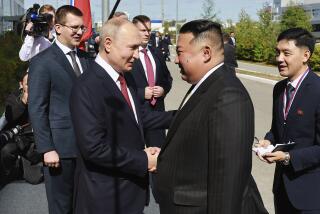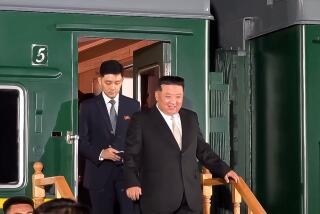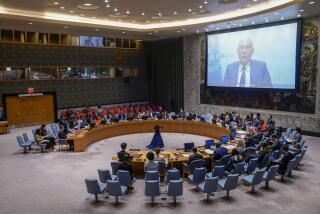U.N. Inspectors, Citing Evasion, Leave N. Korea
- Share via
SEOUL — A U.N. team left North Korea on Saturday after the Communist state rejected proposals for monitoring the refueling of a nuclear reactor, heightening prospects that the U.N. Security Council will take up punitive sanctions.
North Korea’s official news agency said, however, that there were no plans to stop unloading spent fuel from the reactor at the Yongbyon nuclear complex.
“It is utterly nonsensical to tell us to suspend the refueling of the reactor,” the Korean Central News Agency, monitored in Tokyo, quoted a North Korean analyst as saying.
The head of the U.N. nuclear watchdog agency told the Security Council in a letter Friday that North Korea was removing fuel rods so fast that the agency could “within days” lose its ability to measure the plutonium produced there.
North Korea has been suspected of converting plutonium from the research reactor into weapons-grade materials for nuclear arms.
The North claims its nuclear program is peaceful, but for more than a year it has evaded demands for full inspections by the International Atomic Energy Agency.
In a statement Saturday from its headquarters in Vienna, the IAEA said team members had left Pyongyang after failing to win an agreement. Two inspectors will remain in North Korea to monitor any further developments, it said.
In Seoul, President Kim Young Sam was quoted as saying it is highly likely that the Security Council will now consider imposing sanctions and that even China, North Korea’s closest ally, would probably support such an action.
“Then the situation on the Korean Peninsula will grow extremely tense,” the opposition party quoted him as telling an opposition leader Saturday. Kim’s office, contacted later, refused to discuss the remarks.
Security Council members met Friday night to discuss the letter from IAEA Director General Hans Blix. More talks were scheduled at the United Nations for Tuesday.
Some U.S. officials believe North Korea already has one or two nuclear bombs, possibly made with plutonium acquired from a 1989 change of fuel rods.
North Korea claims it removed only a small number of fuel rods that year--too few to make nuclear bombs--but the IAEA says it has reason to suspect the North has more plutonium than that.
Physical analysis of certain rods in the reactor’s core would enable the IAEA to establish their age, thereby revealing how many were withdrawn in 1989.
The fuel rods currently being removed from the reactor are said to contain enough plutonium for several bombs.
More to Read
Sign up for Essential California
The most important California stories and recommendations in your inbox every morning.
You may occasionally receive promotional content from the Los Angeles Times.













